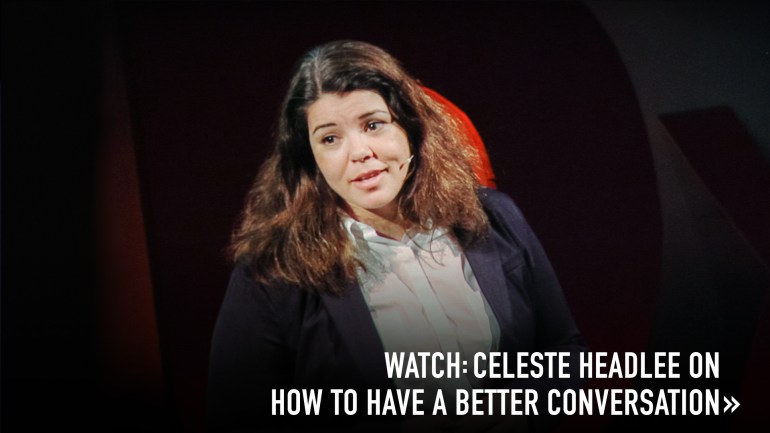
We must begin to talk and, more importantly, listen to those who disagree with us, says Celeste Headlee. She offers 4 smart ways to discuss politics without getting in a fight.
I overheard someone in the line at Starbucks in Atlanta, talking about a co-worker. “I asked HR to move my desk today,” she said. “I just can’t talk to Rachel anymore, even about work. She’s got [presidential candidate X’s] stickers all over her car. What could I possibly say to her?”
I’ve heard some version of this complaint on a regular basis for the past year and more about candidates on the other side, too. Then another friend on Facebook just posted an angry message to anyone who’s voting third party: “Just unfriend me. You are not just making a mistake. You are a bad person.” (I’m paraphrasing for privacy’s sake.)
I’m not here to scold you or shame you or make you feel bad for avoiding political discussions. I totally understand why someone would do that, and I’ve definitely done it myself.
We live in an age in which it’s very difficult to avoid conversations about politics, because nearly everything has become political. A difference in politics can cause arguments that end friendships, marriages, even business relationships.
While I understand why we all avoid talking about politics, I think it’s time to get over our discomfort and wade in. Look around your neighborhood, your city, your state, your nation and the world. I’m not so naïve as to believe that conversations can solve the world’s problems, but I can say with confidence that not having those conversations will make those problems significantly worse.
So we must begin to talk and — more important — listen to those who disagree with us on refugees, online privacy, taxes, religion and everything else. We must have conversations, so we can eventually reach a compromise.
Here are some strategies on how to talk about politics without getting into a fight.
1. Don’t try to educate anyone
Don’t start a conversation intending to prove someone is wrong or to change their mind. Neurological research shows that it’s really hard to change our own minds, let alone someone else’s. If that’s your goal, you will be disappointed and you’ll also annoy the person you’re speaking to.
2. Don’t pre-judge
Listen to people with an open mind. If someone likes a candidate you hate,it doesn’t mean you should discount everything they say or that you won’t find common ground. Amaryllis Fox, a former Clandestine Service Officer with the CIA, talked recently about how she was able to talk with extremists whose actions she deplored.
She said, “Everybody believes they are the good guy. The only real way to disarm your enemy is to listen to them. If you hear them out, if you’re brave enough to really listen to their story, you can see that more often than not, you might have made some of the same choices if you’d lived their life instead of yours.”
I don’t believe she’s saying you have to approve of their decisions or philosophy. I think she’s talking about empathy — having the ability to understand why someone believes what they do. If you dehumanize another person, it’s very difficult to converse with them.
The purpose of listening is not to endorse, but to understand.
3. Show respect
Respect is more important than tolerance. To respect another person is to refrain from calling them names, discounting their ideas or using frequent interruptions to talk over them or perplex them. It also means taking turns, so that you allow them to respond to your questions and share an equal time to express their point of view.
Showing respect means you accept the other person has made choices for what they think are good reasons and you grant them the right to express their opinions. The vast majority of people you know believe they are doing the best they can — they truly believe their candidate or their policies will make the world a better place. Practice seeing people with whom you disagree as people who are trying to achieve a positive result.
4. Stick it out
When a conversation becomes awkward or difficult, work through it. Don’t crack a joke or change the subject; just work through the awkwardness. Keep going through the fog, because the light is bright on the other side.
It can be tempting, as soon as someone expresses a strong opinion — whether it’s on abortion or immigrants or civil rights — to test the waters with a comment or two. If you find the water too hot, you yank that toe out and run from the room.
But the most important conversations are those that people are the most passionate about, those that people are the most emotional about. They are messy and frustrating and even uncomfortable, but they’re also often worth it. And they are necessary if we are to find common ground and begin to solve some of the serious problems facing our global society.
Of course, I am not recommending you engage with someone who is verbally abusive or purposefully offensive. If someone is insulting you, that’s a sure sign they aren’t interested in a productive conversation and you should walk away.
But if there’s a chance you might hear a new perspective or learn about another’s experience, it’s worth the frustration. If there’s a chance you might enlighten someone else with your view or help them see the opposing side as human and worthy of respect, it’s worth the time and the effort.
You will probably not reach agreement in a discussion about politics. You will most likely not convince them to change their opinions or worldview. But you might get them to think more carefully — and that’s valuable.
There’s joy in the exchange of ideas, even those that are in opposition. There is enlightenment in simply understanding another’s perspective. So let’s prepare ourselves to hear things that we don’t like. Let’s take pleasure in hearing from someone whose ideas are at odds with our own, knowing that new perspectives make us stronger and wiser. Let’s start the conversation.


















